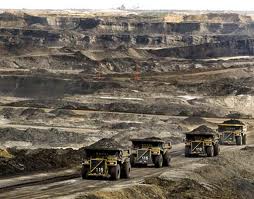 After drawing attention to climatologist Jason Box’s intention to take part in the act of civil disobedience planned at Washington over the next fortnight, I thought it might be useful to underline why the proposed Keystone XL pipeline, which will carry crude oil from the tar sands of Alberta to refineries in Illinois, Oklahoma and Texas, is so appalling a prospect. James Hansen puts it plainly in a short paper he issued a couple of months ago. It’s the sheer size of the tar sands resource which makes it alarming. Hansen acknowledges that there are multiple objections to the pipeline, including the destruction of the environment in Canada and the likelihood of spills along the pipeline’s pathway, though thinks it unlikely that these will be enough to stop it going ahead. But it’s the climate change implication which is crucial: Continue reading “Why Tar Sands Must Stay in the Ground”
After drawing attention to climatologist Jason Box’s intention to take part in the act of civil disobedience planned at Washington over the next fortnight, I thought it might be useful to underline why the proposed Keystone XL pipeline, which will carry crude oil from the tar sands of Alberta to refineries in Illinois, Oklahoma and Texas, is so appalling a prospect. James Hansen puts it plainly in a short paper he issued a couple of months ago. It’s the sheer size of the tar sands resource which makes it alarming. Hansen acknowledges that there are multiple objections to the pipeline, including the destruction of the environment in Canada and the likelihood of spills along the pipeline’s pathway, though thinks it unlikely that these will be enough to stop it going ahead. But it’s the climate change implication which is crucial: Continue reading “Why Tar Sands Must Stay in the Ground”
Tag: tar sands
Moving the earth for oil
 Ethical oil. That’s what Canada is producing from its massive tar sands operation, according to the newly appointed Environment Minister Peter Kent. I admit to having missed that dimension in what I have read of the oil extraction from tar sands. I understood that when the CO2 emissions from its production is added to the CO2 from its combustion it emits between 10 and 45 percent more than conventional crude. I also understood that the environmental effects of the mining and extraction process are appalling, that restoration undertakings are more promised than real and that First Nation communities are gravely affected. Most telling of all I understood that according to James Hansen if the world wants to have a chance of avoiding dangerous climate change it must not only rapidly phase out coal emissions but also leave unconventional fossil fuels such as oil from tar sands in the ground.
Ethical oil. That’s what Canada is producing from its massive tar sands operation, according to the newly appointed Environment Minister Peter Kent. I admit to having missed that dimension in what I have read of the oil extraction from tar sands. I understood that when the CO2 emissions from its production is added to the CO2 from its combustion it emits between 10 and 45 percent more than conventional crude. I also understood that the environmental effects of the mining and extraction process are appalling, that restoration undertakings are more promised than real and that First Nation communities are gravely affected. Most telling of all I understood that according to James Hansen if the world wants to have a chance of avoiding dangerous climate change it must not only rapidly phase out coal emissions but also leave unconventional fossil fuels such as oil from tar sands in the ground.
But I didn’t understand that tar sand oil was ethical. What makes it so? The Minister explains:
